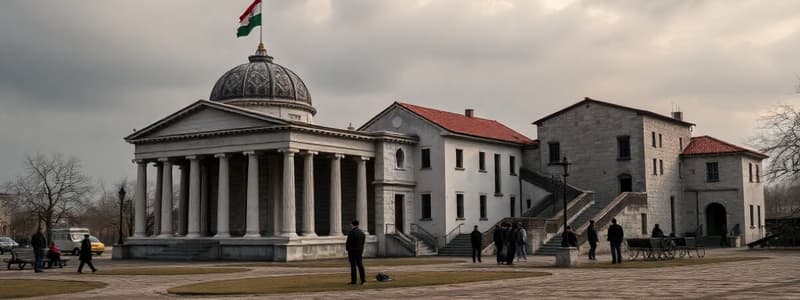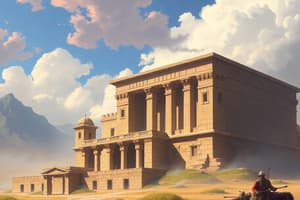Podcast
Questions and Answers
ऐतिहासिक अध्ययन का मुख्य लाभ क्या है?
ऐतिहासिक अध्ययन का मुख्य लाभ क्या है?
- यह भविष्यवाणियाँ करने में मदद करता है।
- यह केवल ऐतिहासिक तथ्यों का संग्रह है।
- यह केवल पुरातात्त्विक अवशेषों पर ध्यान केंद्रित करता है।
- यह वर्तमान को समझने में सहायता करता है। (correct)
इतिहास अध्ययन में कौन सी चुनौती प्रमुख है?
इतिहास अध्ययन में कौन सी चुनौती प्रमुख है?
- सूचना की अधिकता।
- प्राथमिक स्रोतों का खोना। (correct)
- ऐतिहासिक भावना का अभाव।
- अभिव्यक्ति की स्वतंत्रता का अभाव।
इतिहास अध्ययन से कौन सी महत्वपूर्ण क्षमता विकसित होती है?
इतिहास अध्ययन से कौन सी महत्वपूर्ण क्षमता विकसित होती है?
- लॉजिकल रीजनिंग कौशल। (correct)
- भाषा का ज्ञान।
- रचनात्मक लेखन कौशल।
- अर्थशास्त्र में विशेषज्ञता।
इतिहास पढ़ने से हमें क्या सीखने को मिलता है?
इतिहास पढ़ने से हमें क्या सीखने को मिलता है?
पर्यावरणीय इतिहास का क्या महत्व है?
पर्यावरणीय इतिहास का क्या महत्व है?
किस प्राथमिक स्रोत की कमी इतिहास के अध्ययन में समस्या उत्पन्न कर सकती है?
किस प्राथमिक स्रोत की कमी इतिहास के अध्ययन में समस्या उत्पन्न कर सकती है?
इतिहास का अध्ययन करने से सहानुभूति कैसे बढ़ाई जा सकती है?
इतिहास का अध्ययन करने से सहानुभूति कैसे बढ़ाई जा सकती है?
इतिहास में पूर्वाग्रह और व्याख्या किस प्रकार की चुनौती प्रस्तुत करते हैं?
इतिहास में पूर्वाग्रह और व्याख्या किस प्रकार की चुनौती प्रस्तुत करते हैं?
ऐतिहासिक अध्ययनों के लिए स्रोतों की पहुँच में कौन सी बाधा होती है?
ऐतिहासिक अध्ययनों के लिए स्रोतों की पहुँच में कौन सी बाधा होती है?
इतिहास की किस अवधारणा में घटनाओं का अनुक्रमिक क्रम शामिल होता है?
इतिहास की किस अवधारणा में घटनाओं का अनुक्रमिक क्रम शामिल होता है?
इतिहास में 'कारण और प्रभाव' का अध्ययन किसको दर्शाता है?
इतिहास में 'कारण और प्रभाव' का अध्ययन किसको दर्शाता है?
इतिहास में पूर्वाग्रह का क्या अर्थ है?
इतिहास में पूर्वाग्रह का क्या अर्थ है?
प्राथमिक स्रोत क्या होता है?
प्राथमिक स्रोत क्या होता है?
इतिहास की कौन सी शाखा राजनीतिक संस्थानों और नेताओं पर ध्यान केंद्रित करती है?
इतिहास की कौन सी शाखा राजनीतिक संस्थानों और नेताओं पर ध्यान केंद्रित करती है?
इतिहास में शब्द 'नैरेटिव' किसको संदर्भित करता है?
इतिहास में शब्द 'नैरेटिव' किसको संदर्भित करता है?
इतिहास में संदर्भ का महत्व क्या है?
इतिहास में संदर्भ का महत्व क्या है?
विभाजन (पीरियडाइजेशन) का क्या उद्देश्य है?
विभाजन (पीरियडाइजेशन) का क्या उद्देश्य है?
आर्थिक इतिहास का अध्ययन किससे संबंधित है?
आर्थिक इतिहास का अध्ययन किससे संबंधित है?
Flashcards
कालक्रम
कालक्रम
समय में घटनाओं का क्रमिक क्रम
कारणता
कारणता
इतिहास में कारण और प्रभाव का अध्ययन
संदर्भ
संदर्भ
ऐतिहासिक घटनाओं के आसपास की परिस्थितियों को समझना
पक्षपात
पक्षपात
Signup and view all the flashcards
व्याख्या
व्याख्या
Signup and view all the flashcards
प्राथमिक स्रोत
प्राथमिक स्रोत
Signup and view all the flashcards
माध्यमिक स्रोत
माध्यमिक स्रोत
Signup and view all the flashcards
ऐतिहासिक पद्धति
ऐतिहासिक पद्धति
Signup and view all the flashcards
काल विभाजन
काल विभाजन
Signup and view all the flashcards
वर्तमान को समझना
वर्तमान को समझना
Signup and view all the flashcards
आलोचनात्मक सोच विकसित करना
आलोचनात्मक सोच विकसित करना
Signup and view all the flashcards
सहानुभूति और समझ को बढ़ावा देना
सहानुभूति और समझ को बढ़ावा देना
Signup and view all the flashcards
गलतियों से सीखना
गलतियों से सीखना
Signup and view all the flashcards
स्मृति को संरक्षित करना
स्मृति को संरक्षित करना
Signup and view all the flashcards
स्रोतों का नुकसान
स्रोतों का नुकसान
Signup and view all the flashcards
पूर्वाग्रह और व्याख्या
पूर्वाग्रह और व्याख्या
Signup and view all the flashcards
स्रोतों की पहुंच
स्रोतों की पहुंच
Signup and view all the flashcards
अपूर्ण रिकॉर्ड
अपूर्ण रिकॉर्ड
Signup and view all the flashcards
Study Notes
Overview of History
- History is the study of past events, particularly in human affairs.
- It involves researching and interpreting primary and secondary sources to understand how societies, cultures, and individuals have changed over time.
- Historians use various methodologies, including source analysis, historical context, and critical thinking, to reconstruct and analyze the past.
Key Concepts in History
- Chronology: The sequential order of events in time. Understanding chronology is fundamental to historical analysis.
- Causation: The study of cause and effect in history; identifying factors leading to historical outcomes. Often complex relationships exist.
- Context: Understanding the circumstances and conditions surrounding historical events. Political, social, economic, and cultural contexts are all important.
- Bias: Preconceived notions or perspectives influencing historical accounts. Recognizing and critically evaluating biases is essential.
- Interpretation: Historians interpret events, not just record them. Multiple interpretations of the same events are common.
- Primary Sources: Original documents or objects from a specific time period (e.g., letters, diaries, photographs, artifacts). These offer direct insight into the past.
- Secondary Sources: Analyses or interpretations of primary sources written by historians (e.g., books, articles).
- Historical Methodology: A structured approach to researching and analyzing the past. This includes source evaluation and contextualization.
- Periodization: Dividing history into distinct periods or eras to study trends and developments. The divisions (e.g., ancient, medieval, modern) are often arbitrary but useful.
- Narrative: The way historians construct stories about the past. Different narratives emphasize different aspects of events.
Branches of History
- Political History: Focuses on political institutions, leaders, and events (e.g., revolutions, wars, elections).
- Social History: Explores social structures, customs, beliefs, and daily life of people in the past.
- Economic History: Studies the economic development and activity of societies over time, from trade to industrialization.
- Cultural History: Examines the development of ideas, values, and beliefs in different cultures and time periods.
- Military History: Analyzes warfare, military strategy, and conflict throughout history.
- Intellectual History: Focuses on the evolution of ideas, philosophies, and intellectual movements.
- Environmental History: Connects human history with environmental changes and their impact.
Importance of Studying History
- Understanding the Present: Studying the past helps understand the present by identifying recurring patterns or origins of contemporary issues.
- Developing Critical Thinking Skills: Historical analysis encourages critical thinking, evaluation of evidence and multiple perspectives, and logical reasoning skills.
- Promoting Empathy and Understanding: Studying different cultures enhances empathy and understanding of diverse human experiences.
- Learning from Mistakes: Studying the past reveals historical mistakes and successes, guiding future choices.
- Preserving Memory: Creating a collective understanding of the past helps preserve memory, values, and cultural heritage.
Challenges in Studying History
- Loss of Sources: Some primary sources are lost, damaged, or destroyed, creating gaps in historical knowledge.
- Bias and Interpretation: Personal biases and preconceived notions can affect how historians interpret events..
- Accessibility of Sources: Records may be challenging or impossible to access due to locations and availability.
- Incomplete Records: Historical records may be incomplete or inaccurate, making precise accounts difficult to reconstruct.
Studying That Suits You
Use AI to generate personalized quizzes and flashcards to suit your learning preferences.




